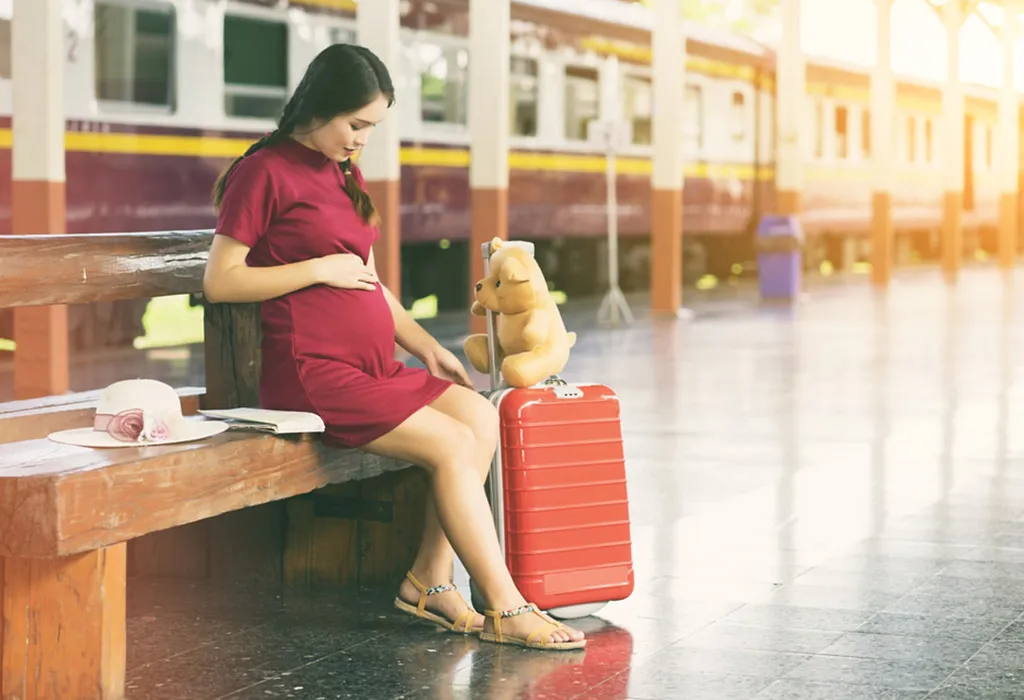Travelling by Train During Pregnancy – Things You Should Know

- Is it Safe to Travel in Train During Pregnancy?
- Who Should Avoid Travelling by Train When Pregnant?
- Pros and Cons of Train Journey for Pregnant Women
- Tips to Make Your Journey by Train Comfortable
- Precautions to Take While Travelling by Train
- Precautions Regarding Food and Drink While Travelling by Train in Pregnancy
- FAQs
Pregnancy necessitates many changes in a woman’s life, and even the simplest activity needs to be reconsidered. Train travel while pregnant is a subject of much discussion, and most women prefer to avoid it altogether. Yet, if you must, travelling by train during pregnancy can be a convenient and comfortable mode of transportation for expectant mothers, offering a scenic and relatively stress-free journey. However, there are important considerations and precautions to keep in mind to ensure the mother’s and baby’s safety and well-being. Read on to consider the pros and cons of train travel during pregnancy and to help decide if it should be your preferred mode of transport.
Is it Safe to Travel in Train During Pregnancy?
Train travel can be quite safe for those with a normal and healthy pregnancy without complications or issues. In the case of those who may be suffering from any health issues such as high blood pressure, high sugar levels, or any other complications, it is better to check with the doctor about the dos and don’ts of train travel in pregnancy. More so, they may evaluate your condition and either allow or prevent you from travelling.
Morning sickness is common among most pregnant women, especially during the first trimester. In such a case, it is better to wait and travel during the second trimester as by then, train movements or any odour in the train may not make you nauseous.
Who Should Avoid Travelling by Train When Pregnant?
While train travel during pregnancy can be generally safe and comfortable for most expectant mothers, there are certain situations where it’s advisable to avoid it altogether.
- High-risk pregnancies, where complications or pre-existing medical conditions pose a risk to the mother or baby.
- Women in their third trimester, particularly after 36 weeks, when the risk of preterm labour increases.
- Pregnant women experiencing complications such as placenta previa, preeclampsia, or gestational diabetes may require closer monitoring and restricted travel (2).
Pros and Cons of Train Journey for Pregnant Women
Train travel is relatively safe during pregnancy for most women with no severe health issues. Here are some pros and cons you should be aware of before you undertake a train journey.

Pros:
- Travelling by train means steady movement, wheels clacking against the tracks, and a chance to enjoy the beautiful scenery outside.
- Train travel is more comfortable than bus, car, or plane travel. There is enough space to allow more movement. You can sit comfortably or even lie down if you feel tired.
- You get to enjoy your time while you are travelling by train. Enjoy the beautiful nature as it passes by, take a nap, read a book, watch a movie, or listen to music on your phone.
- Even if it is a simple train, there will be restrooms, which make your travel more relaxed. And if it is a luxurious train, then you can be assured of being taken good care of and having a chance to enjoy a great trip with the best amenities and great food.
- Also, no traffic means you reach your destination faster, and there is less pollution to take in a while travelling by train than road travel.
Cons:
- There can be cons depending on which kind of train you take.
- If the train lacks amenities or is crowded, it can be quite inconvenient. If there is no AC compartment, there will be more discomfort.
- The kind of seats you get can also be a con if they are faced backwards, which may aggravate or trigger morning sickness.
- Boarding the train can be difficult depending on how long you are into your pregnancy.
Tips to Make Your Journey by Train Comfortable
Ensuring a comfortable journey by train during pregnancy involves thoughtful preparation and attention to specific needs. With the right strategies and considerations, expectant mothers can make their travel experience more pleasant, minimising discomfort and maximising convenience.
- Book a comfortable train and a more comfortable seat. If possible, get an air-conditioned compartment to ensure convenient travel.
- Though many trains provide pillows and blankets, it is better to carry your own because your pillows can ensure better comfort. Also, during pregnancy, using your own blankets rather than the railway’s is better.
- Of course, if it is an overnight trip, you will have a sleeping compartment, but even if it is a full-day trip, consider getting a sleeping coach so that you can lie down a little or rest at regular intervals.
- Another point that goes without saying is that you will need to take the lower berth.
- Do not take seats near the bathroom or the door to avoid crowds, pushing, and nausea due to odour.
- Take a walk every hour so that you do not get cramps or uneasiness. Walks also help in better blood circulation. This can prevent the risk of blood clots (1).
- When you are asleep, ensure that your position is comfortable and, if possible, rest your legs in an elevated position.
- Wear comfortable clothing. Opt for comfortable shoes as well, as they ensure that blood circulation is not obstructed.
- Ensure that you take seats that face the direction of the train so that you do not feel any discomfort.
- Carry enough tissues and antibacterial wipes/ sprays with you so that when you use the restroom, you can wipe off the seat first to avoid urinary tract infections.
- It is advisable to use the restroom when the train halts. If the pregnancy is advanced, take someone along to stay out in an emergency.

Precautions to Take While Travelling by Train
When travelling by train during pregnancy, taking necessary precautions is essential to ensure the safety and well-being of both the mother and the baby. By understanding risks and how to mitigate them, expectant mothers can enjoy their journey with peace of mind, minimising any complications.
- Try to have company, preferably your spouse, family member, or friend. In case, travelling alone is unavoidable, ensure that you are prepared for the solo trip. Only carry a few bags. Since you should not lift heavy bags, carry a suitcase with wheels if a porter is unavailable.
- Arrive early to have enough time to be ready and board comfortably. It is better to find the exact departure time of the train so that you reach a manageable amount in advance and don’t have to wait uncomfortably at the railway station.
- Try to sit comfortably, and keep your legs stretched (3).
- Lock your baggage to safely go to the restroom without fearing someone stealing your belongings or adulterating any food.
- Stay away from any crowds. If there is a rush by the train door, stay away from the crowds to ensure you don’t get pushed or injured accidentally.
- If you have to walk a distance to the platform or cross any bridge, it will be better to have a porter or someone carry your luggage.
- In addition to the medicines you are taking, carry medicines for colds, headaches or any infections after checking with your doctor (4).
- Keep your phone fully charged always. Carry a power bank with you.
- Keep your medical file with you. You should save your doctor’s number on your phone under ‘My doctor’ or ‘My Gynaec’ so that if there is an emergency, the person with you or your fellow passenger can call them up and ask for advice.
- It is better if you do not accept food or drinks from strangers. Just say a polite ‘no’.

Precautions Regarding Food and Drink While Travelling by Train in Pregnancy
Maintaining a balanced diet and staying hydrated are crucial aspects of a healthy pregnancy, especially while travelling by train. However, there are specific precautions expectant mothers should take regarding food and drink to ensure their safety and their baby’s well-being (5).
- It is best to carry food and water when travelling by train during the first trimester of pregnancy. For water, you can depend on bottled water, but ensure that the seal is well in place.
- Stay off any station to buy anything, as the street vendors may not be hygienic. In addition, you may feel the rush to return to the train in time, which could lead to untimely accidents. Instead, if you require any packaged food, you can buy it from vendors passing through the train or at the window.
- Carry chocolates, protein bars or any other snacks to munch on whenever you feel hungry.
- If it is short train travel during pregnancy in the third trimester, your home food may last for the whole trip, but if it is a long journey, you may have to rely on the train food. In that case, check with them and buy well-cooked and hot meals.
- Avoid salad, curd, or any other uncooked food, as they can spoil quickly and easily.
- Drink lots of water to stay fresh and hydrated. If possible, avoid coffee and tea, and if not, limit your intake. Aerated drinks are a strict no-no.
- If you are buying any packaged food, then ensure that you check the expiry dates first.
FAQs
1. Are there any restrictions on train travel during pregnancy’s first, second and third trimester?
While there are no specific restrictions on train travel during pregnancy, avoiding long journeys is generally recommended, especially in the third trimester. Travelling after 36 weeks may pose risks, and you should consult with your healthcare provider before making any travel plans.
2. How can I manage nausea and motion sickness while travelling by train?
To alleviate nausea and motion sickness, try sitting near windows for fresh air and focusing on a fixed point in the distance. Eating small, frequent meals and staying hydrated can also help reduce symptoms.
3. Are there any specific seating preferences for pregnant travellers on trains?
Pregnant travellers may prefer seats with extra legroom or near restrooms for convenience. Additionally, aisle seats can provide easier access for stretching and walking during the journey.
4. What should I do if I experience discomfort or swelling during the journey?
Take regular breaks to stretch your legs and walk around to manage discomfort and swelling. Wearing compression socks and staying hydrated can also help improve circulation and reduce swelling.
Train travel for most pregnant women can be hassle-free and fun if you have the proper guidance and support. Prepare and meet your doctor before you set out for an enjoyable trip.
References/Resources:
1. Traveling While You Are Pregnant; Brigham and Women’s Hospital; https://www.brighamandwomens.org/obgyn/brigham-obgyn-group/patient-education/traveling-while-you-are-pregnant#
2. Travel During Pregnancy; American College of Obstetricians and Gynecologists; https://www.acog.org/womens-health/faqs/travel-during-pregnancy
3. Travelling while pregnant; Government of Canada; https://travel.gc.ca/travelling/health-safety/travelling-pregnant
4. Travelling in pregnancy; NHS; https://www.nhs.uk/pregnancy/keeping-well/travelling/
5. Pregnant Travelers; Centers for Disease Control and Prevention; https://wwwnc.cdc.gov/travel/page/pregnant-travelers
Also Read:
Boating while Pregnant
Travelling By Bus in Pregnancy
Travelling By Car during Pregnancy
Riding a Two Wheeler when Pregnanct
Was This Article Helpful?
Parenting is a huge responsibility, for you as a caregiver, but also for us as a parenting content platform. We understand that and take our responsibility of creating credible content seriously. FirstCry Parenting articles are written and published only after extensive research using factually sound references to deliver quality content that is accurate, validated by experts, and completely reliable. To understand how we go about creating content that is credible, read our editorial policy here.




































